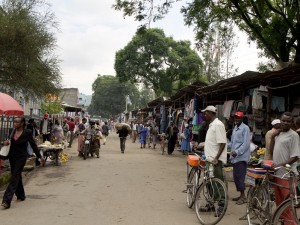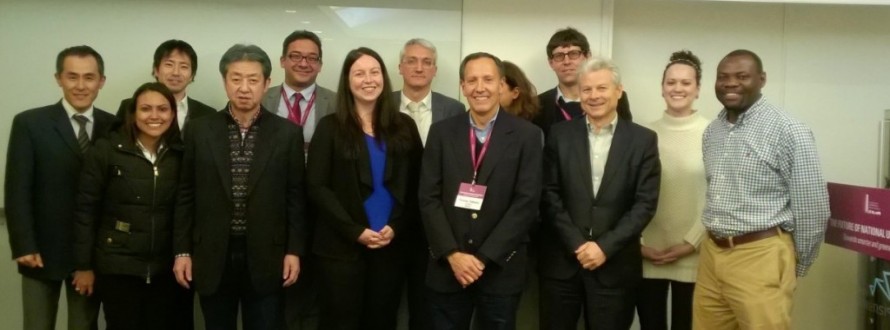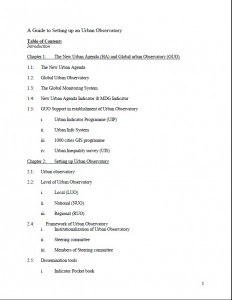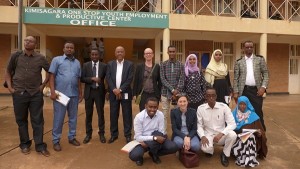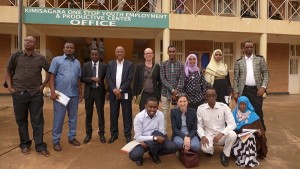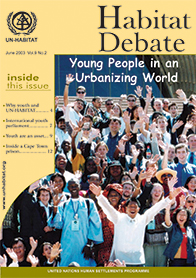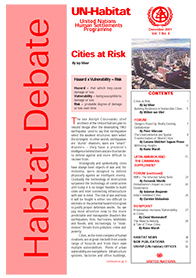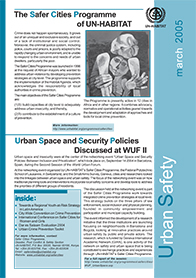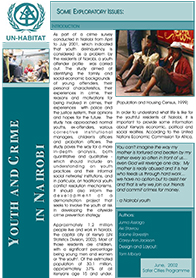in International
von admin
Kenya, 14 January 2016 – UN-Habitat is launching a competition to promote collaboration between Kenya’s students and their peers elsewhere and to promote the importance of urban design. The competition is being organized in collaboration with Kenya’s Urban Development Department (UDD) and the Ministry of Land, Housing and Urban Development. It is part of UN-Habitat’s
Mittwoch, der 13. Januar 2016
in International
von admin
South Korea, 13 January 2016 – UN-Habitat and OECD hosted the second Expert Group Meeting of Policy Unit Three, National Urban Policies, during the National Urban Policy Week in Incheon, South Korea. It took place from 15-16th December and brought together 13 participants. Experts discussed the importance of National Urban Policy for the New Urban
in International
von admin
South Korea, 13 January, 2016 – More than 250 urban policy makers, government officials, development partners and non-governmental actors from more than 25 countries met in South Korea for a week of activities around National Urban Policies from December 14-18 2015. Opening the National Urban Policy Week by video link, Dr. Joan Clos, Executive Director of
in International
von admin
More than half of the world population is living in cities and the number is growing everywhere. Cities are suffering from an acute crisis that hinders their capacity to develop sound policy and provide much-needed services to their residents: a crisis of accurate, useful information. Lacking detailed knowledge and information on the demographic, economic, cultural,
Dienstag, der 12. Januar 2016
in International
von admin
Kimisagara One-Stop Youth Centre group Rwanda, 12 January 2016 – UN-Habitat supported a Somalian delegation on a learning tour to the Kimisagara One-Stop Youth Centre in Kigali, Rwanda, as part of its work with the Federal Government of Somalia and the UN Joint Programme on Youth Employment. UN-Habitat’s Youth Unit developed the One-Stop Youth Centre
Dienstag, der 12. Januar 2016
in International
von admin
Somali delegation at Kimisagara One-Stop Youth Centre Rwanda, 12 January 2016 – UN-Habitat supported a Somali delegation on a learning tour to the Kimisagara One-Stop Youth Centre in Kigali, Rwanda, as part of its work with the Federal Government of Somalia and the UN Joint Programme on Youth Employment. UN-Habitat’s Youth Unit developed the One-Stop
in International
von admin
Cities are our destiny. Visions of a non- or de-urbanizing world, while interesting and important intellectual creations of the 20th century, arIn a world where the number of young people has become the largest in history relative to the adult population, the need to take urgent and ever more innovative approaches to the problems facing
in International
von admin
Cities are our destiny. Visions of a non- or de-urbanizing world, while interesting and important intellectual creations of the 20th century, are no longer credible. Habitat Debate Vol. 7, No. 4, Cities at Risk 971.85 KB 2 downloads
Source: unhabitat.org
in International
von admin
Crime does not happen spontaneously. It grows out of an unequal and exclusive society, and outof a lack of institutional and social control. Moreover, the criminal justice system, including police, courts and sons, is poorly adapted to the rapidly changing urban environment, and is unable to respond to the oncerns and needs of urban dwellers,
in International
von admin
As part of a crime survey conducted in Nairobi from April to July 2001, which indicated that youth delinquency is considered as a problem by the residents of Nairobi, a youth offender profile was carried out. The study aimed at identifying the family and social-economic backgrounds of young offenders, their personal characteristics, their experiences in

Neueste Beiträge
- Experts internationaux et nationaux,(Conakry, Guinée et à domicile), DATE DE CLOTURE: 30 juin 2019
- Call for Expressions of Interest to Host the Global Water Operators’ Partnerships Alliance Secretariat
- EoI – URBAN PATHWAYS – Supporting Low Carbon Plans for Urban Basic Services in the context of the New Urban Agenda
- Sierra Leone hosts stakeholders meeting on New Urban Agenda and WUF 10
- Declaration of the First Global Stakeholder Forum of the First UN Habitat Assembly
Archive
- Juni 2019
- Mai 2019
- April 2019
- März 2019
- Februar 2019
- Januar 2019
- Dezember 2018
- November 2018
- Oktober 2018
- September 2018
- August 2018
- Juli 2018
- Juni 2018
- Mai 2018
- April 2018
- März 2018
- Februar 2018
- Januar 2018
- Dezember 2017
- November 2017
- Oktober 2017
- September 2017
- August 2017
- Juli 2017
- Juni 2017
- Mai 2017
- April 2017
- März 2017
- Februar 2017
- Januar 2017
- Dezember 2016
- November 2016
- Oktober 2016
- September 2016
- August 2016
- Juli 2016
- Juni 2016
- Mai 2016
- April 2016
- März 2016
- Februar 2016
- Januar 2016
- Dezember 2015
- September 2015
- April 2014
- Dezember 2012
- März 2012

